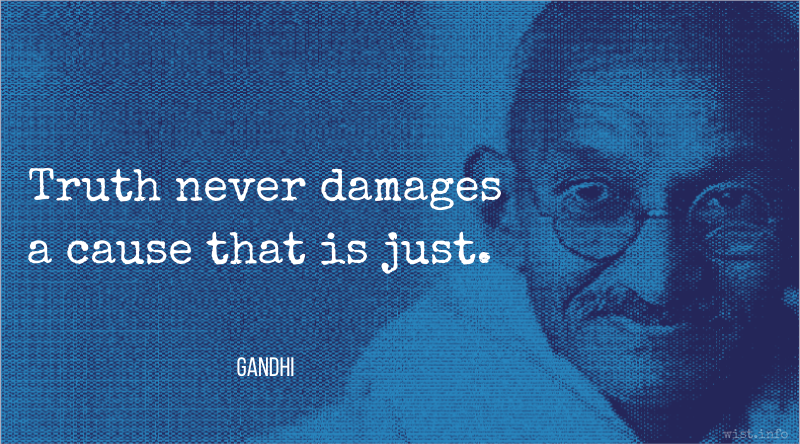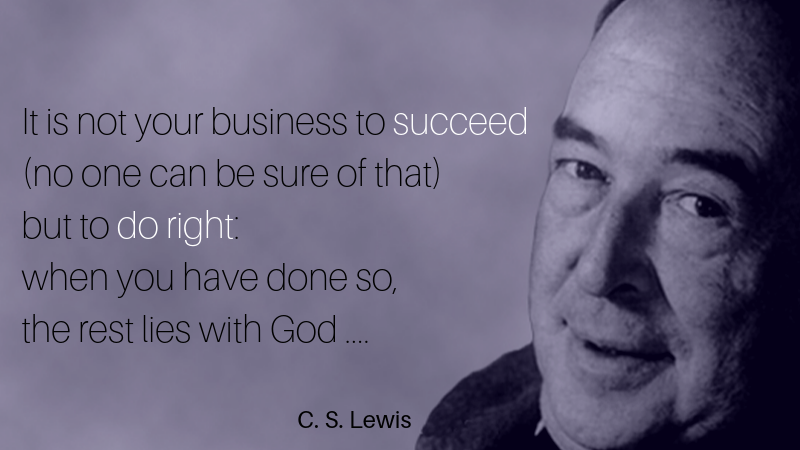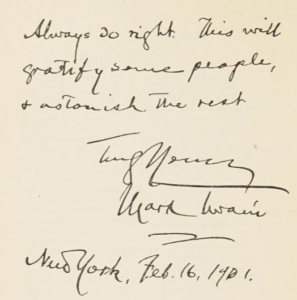There is nothing which a prudent man must shun more carefully than living with a view to popularity and giving serious thought to the things esteemed by the multitude, instead of making sound reason his guide of life, so that, even if he must gainsay all men and fall into disrepute and incur danger for the sake of what is honourable, he will in no wise choose to swerve from what has been recognized as right.
[ἀλλ᾽ οὐκ ἔστιν ὃ μᾶλλον φευκτέον τῷ σωφρονοῦντι, τοῦ πρὸς δόξαν ζῆν, καὶ τὰ τοῖς πολλοῖς δοκοῦντα περισκοπεῖν, καὶ μὴ. τὸν ὀρθὸν λόγον ἡγεμόνα ποιεῖσθαι τοῦ βίου, ὥστε, κἂν πᾶσιν ἀνθρώποις ἀντιλέγειν, κἂν ἀδοξεῖν καὶ κινδυνεύειν ὑ ὑπὲρ τοῦ καλοῦ δέῃ, μηδὲν αἱρεῖσθαι τῶν ὀρθῶς ἐγνωσμένων παρακινεῖν.]
Basil of Caesarea (AD 330-378) Christian bishop, theologian, monasticist, Doctor of the Church [Saint Basil the Great, Ἅγιος Βασίλειος ὁ Μέγας]
Address to Young Men on Reading Greek Literature, ch. 9, sec. 25 [tr. Deferrari/McGuire (1933)]
(Source)
Quotations about:
righteousness
Note not all quotations have been tagged, so Search may find additional quotes on this topic.
When we are working at a difficult task and strive after a good thing we fight a righteous battle, the direct reward of which is that we are kept from much evil.
The gentleman admires rightness above all. A gentleman who possessed courage but lacked a sense of rightness would create political disorder, while a common person who possessed courage but lacked a sense of rightness would become a bandit.
[君子義以爲上、君子有勇而無義、爲亂、小人有勇而無義、爲盜]
[君子义以为上君子有勇而无义为乱小人有勇而无义为盗]Confucius (c. 551- c. 479 BC) Chinese philosopher, sage, politician [孔夫子 (Kǒng Fūzǐ, K'ung Fu-tzu, K'ung Fu Tse), 孔子 (Kǒngzǐ, Chungni), 孔丘 (Kǒng Qiū, K'ung Ch'iu)]
The Analects [論語, 论语, Lúnyǔ], Book 17, verse 23 (17.23) (6th C. BC – AD 3rd C.) [tr. Slingerland (2003)]
(Source)
When asked if a gentleman (junzi) values valor. Annping Chin's notes suggest that the two uses of junzi are different: the first, speaking in general of a moral person, the second of a person of high status (vs the person of low status, xiaoren) following).
(Source (Chinese) 1, 2). Alternate translations:
The superior man holds righteousness to be of highest importance. A man in a superior situation, having valour without righteousness, will be guilty of insubordination; one of the lower people having valour without righteousness, will commit robbery.
[tr. Legge (1861)]
Righteousness he counts higher. A gentleman who is brave without being just may become turbulent; while a common person who is brave and not just may end in becoming a highwayman.
[tr. Jennings (1895)]
A gentleman esteems what is right as of the highest importance. A gentleman who has valour, but is without a knowledge and love of what is right, is likely to commit a crime. A man of the people who has courage, but is without the knowledge and love of what is right, is likely to become a robber.
[tr. Ku Hung-Ming (1898)]
Men of the superior class deem rectitude the highest thing. It is men of the superior class, with courage but without rectitude, who rebel. It is men of the lower class, with courage but without rectitude, who become robbers.
[tr. Soothill (1910)]
The proper man puts equity at the top, if a gentleman have courage without equity it will make a mess; if a mean man have courage without equity he will steal.
[tr. Pound (1933)]
A gentleman gives the first place to Right. If a gentleman has courage but neglects Right, he becomes turbulent. If a small man has courage but neglects Right, he becomes a thief.
[tr. Waley (1938)]
The perfect gentleman is given to justice and assigns to it first place. If the perfect gentleman possesses courage but not justice, there will be disorders. In the case of the mean man, there will be burglaries.
[tr. Ware (1950), 17.21]
For the gentleman it is morality that is supreme. Possessed of courage but devoid of morality, a gentleman will make trouble while a small man will be a brigand.
[tr. Lau (1979)]
Rightness the gentleman regards as paramount; for if a gentleman has courage but lacks a sense of right and wrong, he will cause political chaos; and if a small man has courage but lacks a sense of right and wrong, he will commit burglary.
[tr. Dawson (1993), 17.21]
A gentleman puts justice above everything. A gentleman who is brave but not just may become a rebel; a vulgar man who is brave but not just may become a bandit.
[tr. Leys (1997)]
The gentleman regards righteousness as supreme. A gentleman who possesses courage but wants righteousness will become rebel; a small man who possesses courage but wants righteousness will become a bandit. [tr. Huang (1997), 17.22]A gentleman stresses the righteousness as a top rule. If a gentleman has the braveness but no righteousness, will be disordered. If a mean person has the braveness but no righteousness, will be a robber.
[tr. Cai/Yu (1998), No. 463]
In fact, the exemplary person gives first priority to appropriate conduct (yi). An exemplary person who is bold yet is lacking a sense of appropriateness will be unruly, while a petty person of the same cut will be a thief.
[tr. Ames/Rosemont (1998)]
With the gentleman, right comes before all else. If a gentleman has courage but lacks a sense of right, he will make a rebellion. If a little man has courage but lacks a sense of right, he will become a thief.
[tr. Brooks/Brooks (1998), 17:21]
The noble-minded honor Duty above all. In the noble-minded, courage without Duty leads to turmoil. In little people, courage without Duty leads to theft and robbery.
[tr. Hinton (1998), 17.22]
The gentleman holds rightness in highest esteem. A gentleman who possesses courage but lacks rightness will become rebellious. A petty man who possesses courage but lacks rightness will turn to thievery.
[tr. Watson (2007)]
The gentleman (junzi) puts rightness at the top. If a man of high status (junzi) has courage but not a sense of rightness, he will create political upheaval. If a lowly man has courage but not a sense of rightness, he will turn to banditry.
[tr. Annping Chin (2014)]
A Jun Zi's top objective is righteousness. If a Jun Zi has valor but acts against righteousness, he is prone to make trouble. If a Xiao Ren has valor but acts against righteousness, he is prone to commit crimes.
[tr. Li (2020)]
The superior man in everything considers righteousness to be essential. He performs it according to the rules of propriety. He brings it forth in humility. He completes it with sincerity. This is indeed a superior man.
[君子義以為質,禮以行之,孫以出之,信以成之,君子哉]
Confucius (c. 551- c. 479 BC) Chinese philosopher, sage, politician [孔夫子 (Kǒng Fūzǐ, K'ung Fu-tzu, K'ung Fu Tse), 孔子 (Kǒngzǐ, Chungni), 孔丘 (Kǒng Qiū, K'ung Ch'iu)]
The Analects [論語, 论语, Lúnyǔ], Book 15, verse 18 (15.18) (6th C. BC – 3rd C. AD) [tr. Legge (1861), 15.17]
(Source)
(Source (Chinese)). Alternate translations, noting where Legge's numbering is used:
When the "superior man" regards righteousness as the thing material, gives operation to it according to the rules of propriety, lets it issue in humility, and become complete in sincerity, -- there indeed is your superior man!
[tr. Jennings (1895), 15.17]
A wise and good man makes Right the substance of his being; he cries it out with judgment and good sense; he speaks it with modesty; and he attains it with sincerity: -- such a man is a really good and wise man!
[tr. Ku Hung-Ming (1898), 15.17]
The noble man takes the Right as his foundation principle, reduces it to practice with all courtesy, carries it out with modesty, and renders it perfect with sincerity, -- such is the noble man.
[tr. Soothill (1910), 15.17]
When a princely man makes the Right his fundamental principle, makes Courtesy his rule in evolving it, Modesty his rule for exhibiting it, and Sincerity his rule for effectuating it perfectly, -- what a princely man he is!
[tr. Soothill (1910), 15.17, alternate]
The proper man gives substance to his acts by equity. He proceeds according to the rites, puts them forth modestly, and makes them perfect by sticking to his word. That's the proper man (in whom's the voice of his forebears).
[tr. Pound (1933), 15.17]
The gentleman who takes the right as his material to work upon and ritual as the guide in putting what is right into practice, who is modest in setting out his projects and faithful in carrying them to their conclusions, he indeed is a true gentleman.
[tr. Waley (1938), 15.17]
He whose very substance is justice; whose actions are governed by the rites; whose participation in affairs is compliant; and whose crowning perfection is truthfulness -- that man is a perfect gentleman.
[tr. Ware (1950)]
The gentleman has morality as his basic stuff and by observing the rites puts it into practice, by being modest gives it expression, and by being trustworthy in word brings it to completion. Such is a gentleman indeed!
[tr. Lau (1979)]
Righteousness the gentleman regards as the essential stuff and the rites are his means of putting it into effect. If modesty is the quality with which he reveals it and good faith is his method of bringing it to completion, he is indeed a gentleman.
[tr. Dawson (1993)]
A gentleman takes justice as his basis, enacts it in conformity with the ritual, expounds it with modesty, and through good faith, brings it to fruition. That is how a gentleman proceeds.
[tr. Leys (1997)]
A gentleman considers righteousness his major principle; he practices it in accordance with the rituals, utters it in modest terms, and fulfils it with truthfulness. A gentleman indeed!
[tr. Huang (1997)]
A gentleman takes the righteousness as his essence, practices with the rituals, words with modesty, and gets achievement with honesty. It is the gentleman.
[tr. Cai/Yu (1998), v. 402]
Having a sense of appropriate conduct [yi] as one's basic disposition [zhi], developing it in observing ritual propriety [li], expressing it with modesty, and consummating it in making good on one's word [xin]; this then is an exemplary person [junzi].
[tr. Ames/Rosemont (1998)]
If a gentleman has right as his substance, and puts it in practice with propriety, promulgates it with lineality, and brings it to a conclusion with fidelity, he is a gentleman indeed!
[tr. Brooks/Brooks (1998), LY17 c0270 addition]
The noble-minded make Duty their very nature. They put it into practice through Ritual; they make it shine through humility; and standing by their words, they perfect it. Then they are noble-minded indeed!
[tr. Hinton (1998)]
The gentleman takes rightness as his substance, puts it into practice by means of ritual, gives it expression through modesty, and perfects it by being trustworthy. Now that is a gentleman!
[tr. Slingerland (2003)]
The gentleman makes rightness the substance, practices it through ritual, displays it with humility, brings it to completion with trustworthiness. That’s the gentleman.
[tr. Watson (2007)]
The gentleman makes rightness the substance. He works at it through ritual propriety; he expresses it with modesty; he brings it to completion by being trustworthy. Now that is a gentleman!
[tr. Annping Chin (2014)]
A Jun Zi regards righteousness and honor as fundamental bases, acts in line with Li, shows humility, delivers promises, and completes contracts with sincerity and trust. If so, he is indeed a Jun Zi.
[tr. Li (2020)]
A leader takes rightness as their essence, puts it into practice through ritual, manifests it through humility, and brings it to fruition through trustworthiness. This is how a leader behaves.
[tr. Brown (2021)]
‘But if you’ll pardon my speaking out, I think my master was right. I wish you’d take his Ring. You’d put things to rights. You’d stop them digging up the Gaffer and turning him adrift. You’d make some folk pay for their dirty work.’
‘I would,’ she said. ‘That is how it would begin. But it would not stop with that, alas!’
J.R.R. Tolkien (1892-1973) English writer, fabulist, philologist, academic [John Ronald Reuel Tolkien]
The Lord of the Rings, Vol. 1: The Fellowship of the Ring, Book 2, ch. 7 “The Mirror of Galadriel” [Sam and Galadriel] (1954)
(Source)
Never from Obstinacy take the Wrong Side because your Opponent has anticipated you in taking the Right One.
[Nunca por tema seguir el peor partido, porque el contrario se adelantó y escogió el mejor.]Baltasar Gracián y Morales (1601-1658) Spanish Jesuit priest, writer, philosopher
The Art of Worldly Wisdom [Oráculo Manual y Arte de Prudencia], § 142 (1647) [tr. Jacobs (1892)]
(Source)
(Source (Spanish)). Alternate translations:
Never to espouse a bad party in spight to an Adversary, who hath taken the better.
[Flesher ed. (1685)]
Never out of stubbornness hold to the wrong side, just because your adversary anticipated you, and chose the right.
[tr. Fischer (1937)]
Don’t defend the wrong side out of stubbornness, just because your opponent happened to arrive first and choose the right side.
[tr. Maurer (1992)]
Incivility is contagious — often spreading by way of righteous indignation until even those without legitimate grievance have come down with symptoms and taken sides.
For justice knows few so completely dedicated to her. Many praise her, but not for themselves; others follow her until danger threatens; and then the false deny her, and the political betray her.
[Que tiene pocos finos la entereza. Celébranla muchos, mas no por su casa; síguenla otros hasta el peligro; en él los falsos la niegan, los políticos la dissimulan.]
Baltasar Gracián y Morales (1601-1658) Spanish Jesuit priest, writer, philosopher
The Art of Worldly Wisdom [Oráculo Manual y Arte de Prudencia], § 29 (1647) [tr. Fischer (1937)]
(Source)
(Source (Spanish)). Alternate translations:
Sure, [Reason] has not many Adherents. There are many who publish her praises, but will not admit her into their Houses. Others follow her as far as danger will permit; but when they come to that, some like false Friends deny her; and the rest, like Politicians, pretend they know her not.
[Flesher ed. (1685)]
What a scanty following has rectitude! Many praise it indeed, but -- for others. Others follow it till danger threatens; then the false deny it, the politic conceal it.
[tr. Jacobs (1892)]
Few are devoted to righteousness. Many celebrate her, but few visit her. Some follow her until things get dangerous. In danger, the false disown her and politicians cunningly disguise her.
[tr. Maurer (1992)]
HENRY: God befriend us as our cause is just.
William Shakespeare (1564-1616) English dramatist and poet
Henry IV, Part 1, Act 5, sc. 1, l. 121 (5.1.121) (1597)
(Source)
Truth never damages a cause that is just.
Mohandas Gandhi (1869-1948) Indian philosopher and nationalist [Mahatma Gandhi]
Non-Violence in Peace and War, Vol. 2 (1949)
(Source)
People don’t ever seem to realize that doing what’s right’s no guarantee against misfortune.
William McFee (1881-1966) English writer
Casuals of the Sea, Book 2, ch 6 (1916)
(Source)
Sometimes paraphrased "Doing what's right is no guarantee against misfortune."
Against all appearances the nature of things works for truth and right forever.
Ralph Waldo Emerson (1803-1882) American essayist, lecturer, poet
“Worship,” The Conduct of Life, ch. 6 (1860)
(Source)
Maturity begins when we’re content to feel we’re right about something without feeling the necessity to prove someone else wrong.
Sydney J. Harris (1917-1986) Anglo-American columnist, journalist, author
(Attributed)
Frequently attributed to Harris, but the original source has not been found. Earliest citation I could find was in Reader's Digest (1973), where it is further credited to the Publishers-Hall Syndicate.
There is always some peace in having submitted to the right. Don’t spoil it by worrying about the results, if you can help it. It is not your business to succeed (no one can be sure of that) but to do right: when you have done so, the rest lies with God ….
C. S. Lewis (1898-1963) English writer, literary scholar, lay theologian [Clive Staples Lewis]
Letter to Arthur Greeves, Collected Letters of C. S. Lewis, Vol. 2: 1931-1949 (2004)
(Source)
Yahweh says this: Practice honesty and integrity; rescue the man who has been wronged from the hands of his oppressor; do not exploit the stranger, the orphan, the widow; do no violence; shed no innocent blood in this place.
The Bible (The Old Testament) (14th - 2nd C BC) Judeo-Christian sacred scripture [Tanakh, Hebrew Bible], incl. the Apocrypha (Deuterocanonicals)
Jeremiah 22:3 [JB (1966)]
(Source)
Alternate translations:
Thus saith the Lord; Execute ye judgment and righteousness, and deliver the spoiled out of the hand of the oppressor: and do no wrong, do no violence to the stranger, the fatherless, nor the widow, neither shed innocent blood in this place.
[KJV (1611)]
I, the Lord, command you to do what is just and right. Protect the person who is being cheated from the one who is cheating him. Do not mistreat or oppress aliens, orphans, or widows; and do not kill innocent people in this holy place.
[GNT (1976)]
Yahweh says this: Act uprightly and justly; rescue from the hands of the oppressor anyone who has been wronged, do not exploit or ill-treat the stranger, the orphan, the widow; shed no innocent blood in this place.
[NJB (1985)]
Thus says the Lord: Act with justice and righteousness, and deliver from the hand of the oppressor anyone who has been robbed. And do no wrong or violence to the alien, the orphan, and the widow, or shed innocent blood in this place.
[NRSV (1989 ed.)]
Thus said GOD: Do what is just and right; rescue from the defrauder anyone who is robbed; do not wrong the stranger, the fatherless, and the widow; commit no lawless act, and do not shed the blood of the innocent in this place.
[RJPS (2023 ed.)]
Speak out on behalf of the voiceless,
and for the rights of all who are vulnerable.
Speak out in order to judge with righteousness
and to defend the needy and the poor.The Bible (The Old Testament) (14th - 2nd C BC) Judeo-Christian sacred scripture [Tanakh, Hebrew Bible], incl. the Apocrypha (Deuterocanonicals)
Proverbs 31:8-9 [CEB (2011)]
(Source)
From the sayings of King Lemuel of Massa, given by his mother. Alternate translations:
Open thy mouth for the dumb in the cause of all such as are appointed to destruction. Open thy mouth, judge righteously, and plead the cause of the poor and needy.
[KJV (1611)]
Speak, yourself, on behalf of the dumb, on behalf of all the unwanted; speak, yourself, pronounce a just verdict, uphold the rights of the poor, of the needy.
[JB (1966)]
Speak up for people who cannot speak for themselves. Protect the rights of all who are helpless. Speak for them and be a righteous judge. Protect the rights of the poor and needy.
[GNT (1976)]
Make your views heard, on behalf of the dumb, on behalf of all the unwanted; make your views heard, pronounce an upright verdict, defend the cause of the poor and the wretched.
[NJB (1985)]
Speak out for those who cannot speak,
for the rights of all the destitute.
Speak out; judge righteously;
defend the rights of the poor and needy.
[NRSV (2021 ed.)]
Speak up for the dumb,
For the rights of all the unfortunate.
Speak up, judge righteously,
Champion the poor and the needy.
[RJPS (2023 ed.)]
Doom for the man who founds his palace on anything but integrity, his upstairs rooms on anything but honesty, who makes his fellow man work for nothing, without paying him his wages, who says, “I will build myself an imposing palace with spacious rooms upstairs”, who pierces lights in it, panels it with cedar, and paints it vermilion.
Are you more of a king for outrivalling others with cedar?
Your father ate and drank, like you, but he practised honesty and integrity, so all went well for him. He used to examine the cases of poor and needy, then all went well. Is not that what it means to know me? – it is Yahweh who speaks.
You on the other hand have eyes and heart for nothing but your own interests, for shedding innocent blood and perpetrating violence and oppression.The Bible (The Old Testament) (14th - 2nd C BC) Judeo-Christian sacred scripture [Tanakh, Hebrew Bible], incl. the Apocrypha (Deuterocanonicals)
Jeremiah 22:13-17 [JB (1966)]
(Source)
Speaking out against Jehoiakim, the King of Judah.
Alternate translations:
Woe unto him that buildeth his house by unrighteousness, and his chambers by wrong; that useth his neighbour's service without wages, and giveth him not for his work; That saith, I will build me a wide house and large chambers, and cutteth him out windows; and it is cieled with cedar, and painted with vermilion.
Shalt thou reign, because thou closest thyself in cedar?
Did not thy father eat and drink, and do judgment and justice, and then it was well with him? He judged the cause of the poor and needy; then it was well with him: was not this to know me? saith the Lord.
But thine eyes and thine heart are not but for thy covetousness, and for to shed innocent blood, and for oppression, and for violence, to do it.
[KJV (1611)]
Doomed is the one who builds his house by injustice
and enlarges it by dishonesty;
who makes his people work for nothing
and does not pay their wages.
Doomed is the one who says,
“I will build myself a mansion
with spacious rooms upstairs.”
So he puts windows in his house,
panels it with cedar,
and paints it red.
Does it make you a better king
if you build houses of cedar,
finer than those of others?
Your father enjoyed a full life.
He was always just and fair,
and he prospered in everything he did.
He gave the poor a fair trial,
and all went well with him.
That is what it means to know the Lord.
But you can only see your selfish interests;
you kill the innocent
and violently oppress your people.
The Lord has spoken.
[GNT (1976)]
Disaster for the man who builds his house without uprightness, his upstairs rooms without fair judgement, who makes his fellow-man work for nothing, without paying him his wages, who says, "I shall build myself a spacious palace with airy upstairs rooms," who makes windows in it, panels it with cedar, and paints it vermilion.
Are you more of a king because of your passion for cedar? Did your father go hungry or thirsty? But he did what is just and upright, so all went well for him. He used to examine the cases of poor and needy, then all went well. Is not that what it means to know me? Yahweh demands.
You on the other hand have eyes and heart for nothing but your own interests, for shedding innocent blood and perpetrating violence and oppression.
[NJB (1985)]
Woe to him who builds his house by unrighteousness
and his upper rooms by injustice,
who makes his neighbors work for nothing
and does not give them their wages,
who says, “I will build myself a spacious house
with large upper rooms,”
and who cuts out windows for it,
paneling it with cedar
and painting it with vermilion.
Are you a king
because you compete in cedar?
Did not your father eat and drink
and do justice and righteousness?
Then it was well with him.
He judged the cause of the poor and needy;
then it was well.
Is not this to know me?
says the Lord.
But your eyes and heart
are only on your dishonest gain,
for shedding innocent blood,
and for practicing oppression and violence.
[NRSV (1989 ed.)]
Ha! He who builds his house with unfairness
And his upper chambers with injustice,
Who makes his neighbors work without pay
And does not give them their wages,
Who thinks: I will build me a vast palace
With spacious upper chambers,
Provided with windows,
Paneled in cedar,
Painted with vermilion!
Do you think you are more a king
Because you compete in cedar?
Your father ate and drank
And dispensed justice and equity --
Then all went well with him.
He upheld the rights of the poor and needy --
Then all was well.
That is truly heeding Me
-- declares GOD.
But your eyes and your mind are only
On ill-gotten gains,
On shedding the blood of the innocent,
On committing fraud and violence.
[RJPS (2023 ed.)]
Spiritual strength and passion, when accompanied by bad manners, only provoke loathing.
Friedrich Nietzsche (1844-1900) German philosopher and poet
The Will to Power, Part 1, “Critique of Religion,” Sec. 175 [tr. Ludovici] (1888)
(Source)
To have a discussion coolly waived when you feel that justice is all on your side is even more exasperating in marriage than in philosophy.
George Eliot (1819-1880) English novelist [pseud. of Mary Ann Evans]
Middlemarch, Book 3, ch. 24 (1871)
(Source)
The last temptation is the greatest treason:
To do the right deed for the wrong reason.T. S. Eliot (1888-1965) American-British poet, critic, playwright [Thomas Stearns Eliot]
Murder in the Cathedral, Act 1 [Thomas] (1935)
(Source)
The humblest citizen of all the land, when clad in the armor of a righteous cause, is stronger than all the hosts of Error.
William Jennings Bryan (1860–1925) American lawyer, statesman, politician, orator
Speech, National Democratic Convention, Chicago (Jul 1896)
(Source)
This is the way of greatness. In the supreme moments of history, terms like duty, truth, justice, and mercy — which in our torpid hours are tired words — become the measure of decision. … The straight and righteous path is the shortest and the surest.
Walter Lippmann (1889-1974) American journalist and author
“The Fascination of Greatness,” Today and Tomorrow (7 Sep 1943)
(Source)
The probability that we may fall in the struggle ought not deter us from the support of a cause we believe to be just; it shall not deter me.
Always do right. This will gratify some people, and astonish the rest.
Mark Twain (1835-1910) American writer [pseud. of Samuel Clemens]
Letter (1901-02-16) to the Young People’s Society, Greenpoint Presbyterian Church, Brooklyn
(Source)
The Society had invited Twain to come and speak. In response, he sent a card with this aphorism on it. A reproduction is in the frontispiece of Bernard DeVoto, ed., Mark Twain in Eruption (1922), which was the earliest citation I could find.
I hate, I despise your festivals, and I take no delight in your solemn assemblies. Even though you offer me your burnt offerings and grain offerings, I will not accept them, and the offerings of well-being of your fatted animals I will not look upon. Take away from me the noise of your songs; I will not listen to the melody of your harps. But let justice roll down like water and righteousness like an ever-flowing stream.
The Bible (The Old Testament) (14th - 2nd C BC) Judeo-Christian sacred scripture [Tanakh, Hebrew Bible], incl. the Apocrypha (Deuterocanonicals)
Amos 5:21-24 [NRSV (1989 ed.)]
(Source)
Alternate translations:
I hate, I despise your feast days, and I will not smell in your solemn assemblies. Though ye offer me burnt offerings and your meat offerings, I will not accept them: neither will I regard the peace offerings of your fat beasts. Take thou away from me the noise of thy songs; for I will not hear the melody of thy viols. 24 But let judgment run down as waters, and righteousness as a mighty stream.
[KJV (1611)]
I hate and despise your feasts, I take no pleasure in your solemn festivals. When you offer me holocausts, I reject your oblations, and refuse to look at your sacrifices of fattened cattle. Let me have no more of the din of your chanting, no more of your strumming on harps. But let justice flow like water, and integrity like an unfailing stream.
[JB (1966)]
The Lord says, “I hate your religious festivals; I cannot stand them! When you bring me burnt offerings and grain offerings, I will not accept them; I will not accept the animals you have fattened to bring me as offerings. Stop your noisy songs; I do not want to listen to your harps. Instead, let justice flow like a stream, and righteousness like a river that never goes dry."
[GNT (1976)]
I loathe, I spurn your festivals,
I am not appeased by your solemn assemblies.
If you offer Me burnt offerings -- or your grain offerings --
I will not accept them;
I will pay no heed
To your gifts of fatlings.
Spare Me the sound of your hymns,
And let Me not hear the music of your lutes.
But let justice well up like water,
Righteousness like an unfailing stream.
[RJPS (2006)]
I hate, I despise your religious festivals; your assemblies are a stench to me. Even though you bring me burnt offerings and grain offerings, I will not accept them. Though you bring choice fellowship offerings, I will have no regard for them. Away with the noise of your songs! I will not listen to the music of your harps. But let justice roll on like a river, righteousness like a never-failing stream!
[NIV (2011 ed.)]
You know my friends, there comes a time when people get tired of being trampled by the iron feet of oppression. […] We are not wrong, we are not wrong in what we are doing. If we are wrong, the Supreme Court of this nation is wrong. If we are wrong, the Constitution of the United States is wrong. And if we are wrong, God Almighty is wrong. If we are wrong, Jesus of Nazareth was merely a utopian dreamer that never came down to Earth. If we are wrong, justice is a lie, love has no meaning. And we are determined here in Montgomery to work and fight until “justice runs down like water, and righteousness like a mighty stream.”
Righteous Indignation: Your own wrath as opposed to the shocking bad temper of others.
Elbert Hubbard (1856-1915) American writer, businessman, philosopher
The Roycroft Dictionary (1914)
(Source)
Vanity asks the question — is it popular? Conscience asks the question — is it right?
Martin Luther King, Jr. (1929-1968) American clergyman, civil rights leader, social activist, preacher
Sermon, Passion Sunday, National Cathedral, Washington, DC (31 Mar 1968)
See also this.
Moral certainty is always a sign of cultural inferiority. The more uncivilized a man, the surer he is that he knows precisely what is right and what is wrong. All human progress, even in morals, has been the work of men who have doubted the current moral values, not of men who have whooped them up and tried to enforce them. The truly civilized man is always skeptical and tolerant in this field as in all others. His culture is based on “I am not too sure.”
H. L. Mencken (1880-1956) American writer and journalist [Henry Lewis Mencken]
Minority Report : H.L. Mencken’s Notebooks, #418 (1956)
(Source)
Indeed, justice is conscience, not a personal conscience but the conscience of the whole of humanity. Those who clearly recognize the voice of their own conscience usually recognize also the voice of justice.
There are also conflicts about important things or ideas. In such cases I am more impressed by the extreme importance of being on the right side, than I am disturbed by the revelation of the jungle of confused motives, private purposes, and individual actions (noble or base) in which the right and the wrong in actual human conflicts are commonly involved.
J.R.R. Tolkien (1892-1973) English writer, fabulist, philologist, academic [John Ronald Reuel Tolkien]
Notes on W. H. Auden’s review of Return of the King (1956)
(Source)
Auden's review: "At the End of the Quest, Victory," New York Times Book Review (1956-01-22).
Tolkien never sent or shared these notes. Reprinted in Humphrey Carpenter, ed., The Letters of J.R.R. Tolkien, #183 (1981).
To see the right and not do it is cowardice.
[見義不爲、無勇也。]
Confucius (c. 551- c. 479 BC) Chinese philosopher, sage, politician [孔夫子 (Kǒng Fūzǐ, K'ung Fu-tzu, K'ung Fu Tse), 孔子 (Kǒngzǐ, Chungni), 孔丘 (Kǒng Qiū, K'ung Ch'iu)]
The Analects [論語, 论语, Lúnyǔ], Book 2, verse 24 (2.24.2) (6th C. BC – AD 3rd C.) [tr. Soothill (1910)]
(Source)
(Source (Chinese)). Alternate translations:
To see what is right and not to do it is want of courage.
[tr. Legge (1861)]
It is (moral) cowardice to leave undone what one perceives to be right to do.
[tr. Jennings (1895)]
To see what is right and to act against one's judgment shows a want of courage.
[tr. Ku Hung-Ming (1898)]
To see justice and not act upon it is cowardice.
[tr. Pound (1933)]
To see what is right and not do it is cowardice.
[tr. Waley (1938)]
It is cowardice to fail to do what is right.
[tr. Ware (1950)]
Faced with what is right, to leave it undone shows a lack of courage.
[tr. Lau (1979)]
To see what is right and not to do it is cowardice.
[tr. Dawson (1993)]
To not act when justice commands, that is cowardice.
[tr. Leys (1997)]
To see something you ought to do and not to do it is want of courage.
[tr. Huang (1997)]
To see something you ought to do and not to do it is want of courage.
[tr. Huang (1997)]
One does not do the righteous things when one sees them, it is not brave.
[tr. Cai/Yu (1998), #40]
Failing to act on what is seen as appropriate [yi] is a want of courage.
[tr. Ames/Rosemont (1998)]
If he sees what is right but does not do it, he lacks courage.
[tr. Brooks/Brooks (1998)]
And to recognize a Duty without carrying it out is mere cowardice.
[tr. Hinton (1998)]
To see what is right, but to fail to do it, is to be lacking in courage.
[tr. Slingerland (2003)]
To see what is right and not do it is cowardly.
[tr. Watson (2007)]
Faced with what is right yet doing nothing about it shows a lack of courage.
[tr. Chin (2014)]
Being aloof from a righteous obligation is cowardice.
[tr. Li (2020)]
Moralism is historically one of America’s great defects. Moralism is intolerant of ambiguity; it perceives reality in extreme terms of good and evil and regards more sophisticated judgments as soft and unworthy. The temptation to moralize is strong; it is emotionally satisfying to have enemies rather than problems, to seek out culprits rather than flaws in the system. God knows it is emotionally satisfying to be righteous with that righteousness that nourishes itself on the blood of sinners. But God also knows that what is emotionally satisfying can be spiritually devastating.
































